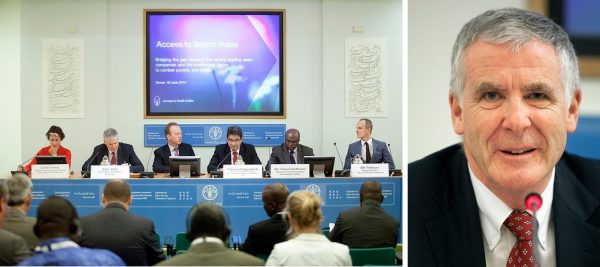Syngenta COO John Atkin welcomed the Access to Seeds Index as “fundamentally a very good idea”. The importance of seeds in raising yields and the mechanism of highlighting good practices are the two main aspects Mr. John Atkin appreciated at the side event of the FAO Conference. At the same time, Mr. Atkin pointed out the complexity of seed businesses and the importance of ‘agronomics’.
Considering the complexity of seed businesses, Mr. John Atkin mentioned the difference between developed and developing agricultural markets. Innovations in seed quality and variety have contributed to eight fold yield increases in the US, while in African countries formal systems are still underdeveloped and even have less market share than informal seed systems. Atkin noted that he sees a role for the private sector in scaling up these formal seeds systems.
Only 50% of the yield comes from seeds, the other 50% from agronomics. Therefore the methodology should give credits as well to extension services, according to Atkin. A challenge for the Access to Seeds Index is how to deal with the different legal frameworks of countries which influence the potential role of the private sector.
As a good practice of a broad responsibility seed companies can take, Mr. Atkin named the ‘Kilimo Salama-project’. It offers insurance for Kenyan farmers to cover for weather risks. This way farmers are more comfortable to invest in seed and other inputs for the production of maize, sorghum and wheat. This project is a partnership between the Syngenta Foundation, Kenyan insurance company UAP and Swiss Re Corporate Solutions. In 2012, over 53.000 farmers were insured, realising a 20% increase in farmer investments.
All side-notes, remarks and expectations will be used as input for the first Access to Seeds Index Round Table in Addis Ababa on 23-24 September, 2013.




